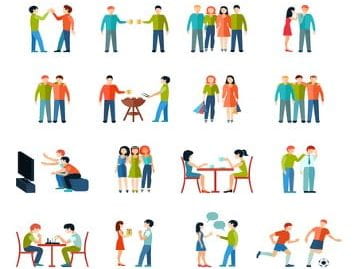By: Jasmine Pettus
Another day, another argument with your mother. She’s accusing you of not studying enough, again. Feelings of frustration fill the pit of your stomach and makes you feel, well, icky. Sometimes you wonder why her criticism makes you feel so upset. It doesn’t feel the same way when you have a disagreement with your boss or friends, so you don’t understand why it bothers you so much.
Don’t worry, you’re not going crazy. This simply means that your TCP level with your mother is high. And no, this does not stand for Totally Cringe Problems.
TCP stands for Taking Conflict Personally and it measures the level of emotional reactions within conflict. When this phenomenon happens, one can encounter feelings of high stress, persecution and pessimism. TCP was first regarded as a personality trait that only occurred in certain people regardless of what relationships they maintained. However, it turns out that the type of relationship is also a potential factor in revealing how conflict is interpreted.
Communication professors Dale Hample from the University of Maryland and Adam Richards from Furman University were curious about the connection between emotionally tense disagreements and relationship types. They predicted that how much conflict was taken personally depended on the type of relationship. Specifically, Hample and Richards hypothesized that relationships that are perceived as less important and satisfying will have higher levels of TCP.
This study, which can be found in the Western Journal of Communication, asked 601 undergraduate students and working adults to complete a survey assessing a relationship from the following options: a romantic partner, biological child, boss, co-worker, or friend. The survey asked participants to answer and rate statements to describe the conflict nature of the chosen relationship. Researchers inquired about whether participants felt feelings of persecution, insecurity, or stress were present when discord occurred with their partner. The survey also included questions about positive and negative consequences that come with relational conflict. This was to determine how different parties weighed the costs of their actions as well as the level of enjoyment when engaging in an argument.
Hample and Richards also had participants evaluate how satisfied and important the relationship of their choosing was to them.
Their findings bring a new perspective to how people process conflict.
They found that TCP varies depending on the relationship type. More valued connections had a higher risk of experiencing TCP. For example, intense relationships like ones with a romantic spouse or a parent are the most likely to generate the most negative emotions in times of conflict. Participants were less likely to personalize conflict with their boss and least likely to take things personally in conflict with friends.
Understanding the types of interpersonal connections around you are key to successfully maintaining relationships. Once you realize the importance and nature of a relationship, it can become easier to navigate conflicts when they arise. Being emotionally aware of yourself and others is a healthy practice that benefits everyone including you.
So, the next time you get into it with your mother, know that you are likely feeling strong emotions because you regard her as an important person in your life. Try communicating your dissatisfaction within the relationship and see if you can find some solutions with her. Maybe then you can take those Totally Cringe Problems and turn it into Total Crafted Peace.
